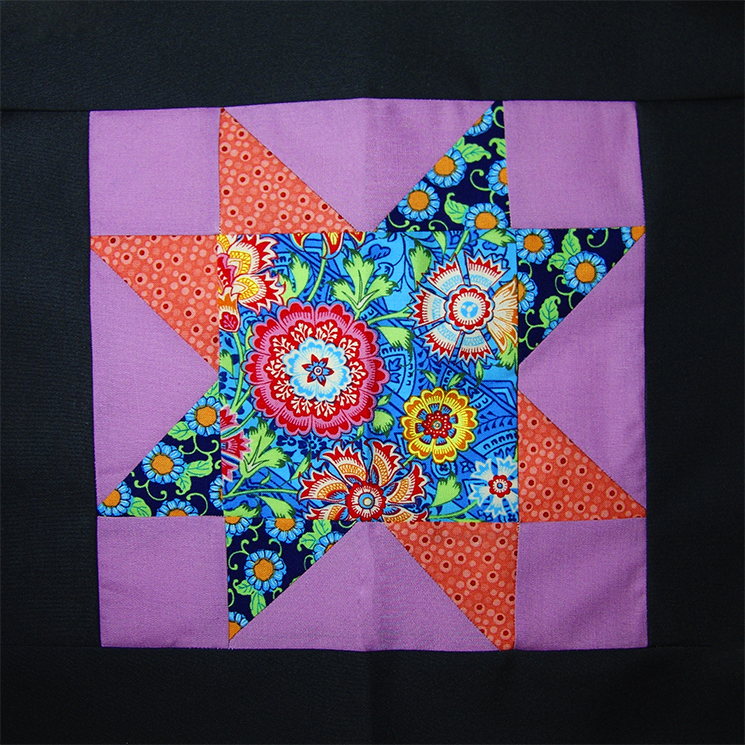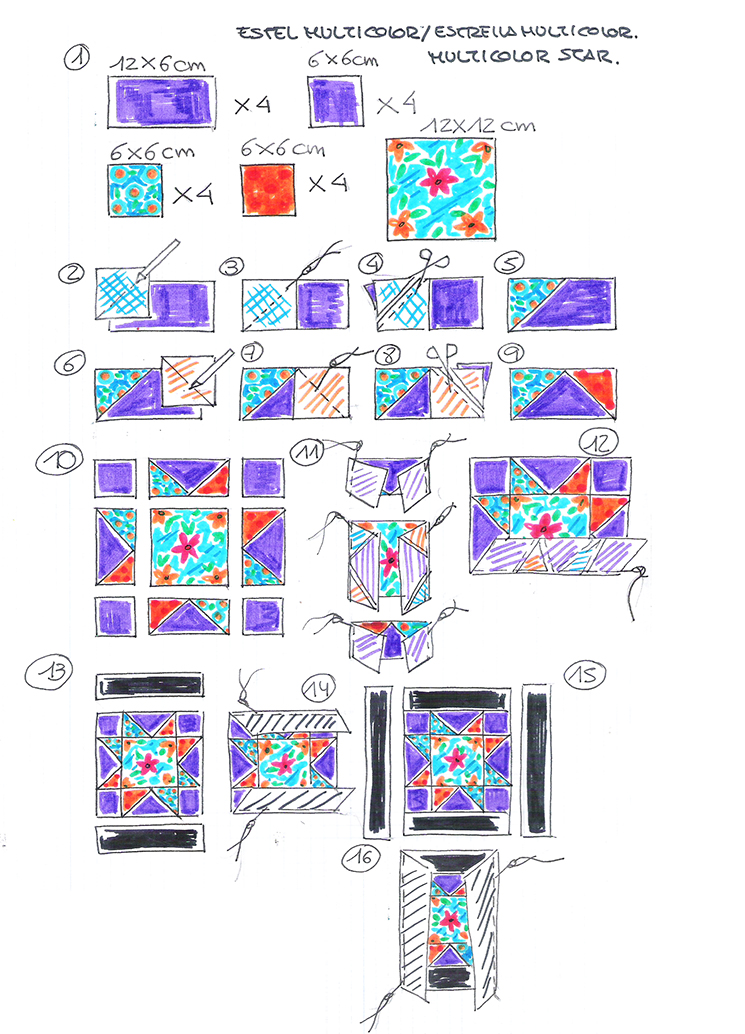ESTEL MULTICOLOR: TUTORIAL DE PATCHWORK.
Aquesta setmana, Les Antònies volem presentar-vos una variació d’un bloc clàssic: l’estel. La tècnica que farem servir és la dels FlyingGeese i ja veureu com queda de divertit i, sobretot, multicolor.
Per fer aquest blocnecessitem 4 rectangles en color llis de 12cmX6cm i, de la mateixa tela, 4 quadratsde 6cmX6cm; també necessitem, en dues teles contrastades, 4 quadrats de 6cmX6cm de cada una i, pel centre del nostre estel, 1 quadrat de 12cmX12cm (1).
Us explicarem com fer el Flying Geese i després repetiu la mateixa tècnica tres vegades més. Agafem un quadrat estampat, dels petits, i dibuixem una diagonal amb llapis (2). Encarem amb un dels rectangles liles i cosim per la línia dibuixada (3); retallem les dues teles per damunt de la costura, deixant uns 0,5cm de marge (4). Planxem i obrim (5). Ara amb altre quadrat, de diferent estampat de l’anterior, repetim la mateixa seqüència: dibuixem la diagonal (6); encarem i cosim per la línia dibuixada (7); retallem, deixant 0,5cm de marge (8) i planxem i obrim (9). Fem la resta de rectangles; hem de tenir la picardia de variar la posició de les teles estampades per obtenir dos d’una manera (blau=dreta; taronja=esquerra) i dos de la manera oposada (taronja=dreta; blau=esquerra).
Col·loquem totes les peces del nostre bloc com a l’esquema (10). Cosim les peces línia a línia (11). Per acabar-ho unim les tres peces com en el dibuix (12). Rematarem emmarcant el bloc amb tires de color gris per ressaltar-lo. Comencem amb dues tires de la mateixa mesura que el bloc, en el nostre cas 23cmX6cm (13). Cosim una dalt i l’altra a baix (14). Afegim dues tires laterals de 33cmX6cm (15). Les cosim als costats (16) i ja tenim el bloc fet. Us hem afegit el dibuix del bloc acabat i us detallem les mesures, quantitats i mostres de tela que hem fet servir.
Ens agrada moltíssim l’alegria d’aquest bloc i esperem que a vosaltres també us transmeti aquest sentiment.
ESTAMPATS I COLORS VIUS PELS ESTELS MÉS ACOLORITS!!!
ESTRELLA MULTICOLOR: TUTORIAL DE PATCHWORK.
Esta semana, Les Antònies queremos presentaros una variación de un bloque clásico: la estrella. La técnica que usaremos es la de los Flying Geese y ya veréis que divertido queda y, sobretodo, multicolor.
Para hacer este bloque necesitamos 4 rectángulos en color liso de 12cmX6cm y, de la misma tela, 4 cuadrados de 6cmX6cm; también necesitamos, en dos telas contrastadas, 4 cuadrados de 6cmX6cm de cada una y, para el centro de nuestra estrella, 1 cuadrado de 12cmX12cm (1).
Os explicaremos como hacer el Flying Geese y después repetid la misma técnica tres veces más. Cogemos un cuadrado estampado, de los pequeños, y dibujamos una diagonal con lápiz (2). Encaramos con uno de los rectánguloslilas y cosemos por la línea dibujada (3); recortamos las dos telas por encima de la costura, dejando unos 0,5cm de margen (4). Planchamos y abrimos (5). Ahora con otro cuadrado, de diferente estampado que el anterior, repetimos la misma secuencia: dibujamos la diagonal (6); encaramos y cosemos por la línea dibujada (7); recortamos, dejando 0,5cm de margen (8) y planchamos y abrimos (9). Hacemos el resto de rectángulos; hemos de tener la picardía de variar la posición de las telas estampadas para obtener dos de una manera (azul=derecha; naranja=izquierda) y dos de la manera opuesta (naranja=derecha; azul=izquierda).
Colocamos todas las piezas de nuestro bloque como en el esquema (10). Cosemos las piezas línea a línea (11). Para acabarlo unimos las tres piezas como en el dibujo (12). Remataremos enmarcando el bloque con tiras de color gris para resaltarlo. Empezamos con dos tiras de la misma medida que el bloque, en nuestro caso 23cmX6cm (13). Cosemos una arriba y otra abajo (14). Añadimos dos tiras laterales de 33cmX6cm (15). Las cosemos a los lados (16) y ya tenemos el bloque hecho. Os adjuntamos el dibujo del bloque acabado y os detallamos las medidas, cantidades y muestras de tela que hemos usado.
Nos gusta muchísimo la alegría de este bloquey esperamos que a vosotr@s también os transmita este sentimiento.
¡¡¡ESTAMPADOS Y COLORES VIVOS PARA LAS ESTRELLAS MÁS COLORISTAS!!!
MULTICOLORED STAR: PATCHWORK TUTORIAL.
This week, Les Antònies would like to present you a variation of a classic block: the star. The technique we use is that of Flying Geese and you already see how it is fun and, above all, multicoloured.
To make this block we need 4 rectangles in plain colour of 12cmX6cm, with the same fabric, 4 squares of 6cmX6cm; also need, in two contrasting fabrics, 4 squares of 6cmX6cm each and, for the centre of our star, 1 square of 12cmX12cm (1).
We will explain how to do the Flying Geeseand then repeat the same technique three times more. We take a pattern square, the small ones, and draw a diagonal with pencil (2). We face one of the lilac rectangles and sew along the drawn line (3); cut two fabrics over seam, leaving approximately 0,5 cm from margin (4). We iron and opened (5). Now with another square of different pattern than the previous, we repeat the same sequence: draw the diagonal (6); we face and sew along the drawn line (7); we cut, leaving 0’5 cm from margin (8). Iron and open (9). Do the rest of rectangles; we have to change the position of the printed fabrics to get two in one way (blue = right; Orange = left) and two of the opposite way (Orange = right; blue = left).
Place all the pieces of our block as the schema (10). Sew the pieces together line by line (11). To end it joined the three pieces as in the drawing (12). Finish it framing the block with grey strips to highlight it. We started with two strips of the same size as the block, in our case 23cmX6cm (13). We sew one up and one down (14). Add two lateral strips of 33cmX6cm (15). We sew them to the sides (16) and have the block made. We attached a drawing of the finished block and you detailed measurements, quantities and samples of fabric that we have used.
We like a lot of the joy of this block and hope that you will also convey this sentiment.
PRINTS AND VIVID COLORS FOR THE MOST COLOURFUL STARS!!!











